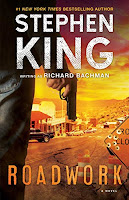Roadwork
Published: March 1981
Author: Stephen King
Genre: American, Crime, Fiction, Literature, Psychological, Rural, Small Town, Teen, Thriller, Young Adult
Check out the review of this book here:
Summary
An unknown guy (later identified as Barton George Dawes) expresses his displeasure with a proposed highway expansion project during a man-on-the-street news interview in August 1972.
The story then skips forward to November 1973, when Dawes visits a gun shop and buys two high-powered firearms: a .44 Magnum revolver and a hunting rifle chambered for .460 Weatherby Magnum ammo.
The novel eventually discloses that Dawes' son Charlie died three years earlier of brain cancer and that Dawes stubbornly refuses or is unable to cut his emotional links to both the industrial laundry where he works and the house where Charlie grew up.
As part of the proposal, the laundry and his entire neighborhood will be bulldozed. Dawes resigns from his middle management position at the laundry after undermining the acquisition of its new facility, and his wife Mary leaves him after learning of both of these activities, as well as his failure to find the pair a new home.
In an effort to procure explosives, Dawes visits Salvatore "Sal" Magliore, the proprietor of a local used-car business with links to organized crime.
Dawes assembles a cargo of Molotov cocktails and uses them to harm the highway construction equipment after Magliore rejects him as a madman.
He is not apprehended, but his activities cause just a little hiccup in the project. Dawes first refuses to accept the city's eminent domain offer for the property but changes his mind after the city's attorney threatens to broadcast his short tryst with Olivia Brenner, a young hitchhiker who had previously taken refuge inside the house.
Magliore inspects Dawes' home for listening devices put by the city and subsequently offers to sell him a cargo of explosives.
Dawes donates half of the proceeds from the house sale to Mary, $5,000 to a homeless guy in a coffee shop, and has Magliore invest the majority of the remaining funds on Olivia's behalf after paying for the explosives.
Dawes wires the entire home with explosives and barricades himself inside in January 1974, with just hours before he is compelled to vacate the premises.
When the cops approach to forcefully evict him, he fires at them, killing no one but causing them to seek shelter and garnering the media's attention.
Dawes coerces the cops into allowing a reporter - the same one who interviewed him in 1972, though neither knows who the other is - to enter and talk with him.
When the reporter leaves, Dawes throws his firearms out the window and detonates his explosives, destroying the home and killing himself.
A brief epilogue explains that the reporter and his colleagues were eventually awarded a Pulitzer Prize for their coverage of the tragedy, which revealed the truth about the expansion project: there was no legitimate purpose for it.
If the city did not build a particular number of miles of road every year, it would be ineligible for federal funds for interstate building projects.
The city discreetly prepared to sue Mary for her portion of the eminent domain settlement but withdrew the claim after public outrage.
Useful Search Related Words & Keywords
Bachman Books, Bart Dawes, Barton George, Eminent Domain, George Dawes, Good Read, King Book, King Writing, Long Walk, Main Character, Well Written
- - - - - - - - - - - - - - - - - - - - - - - - - - - - - - - - - -
Any kind of support, even a simple 'like, thumbs up or a small comment' is enough and helps me grow, create and freely do more stuff and work on projects for the benefit of many.
Buy me a coffee: https://www.buymeacoffee.com/namsu
Help me grow into a global force: https://www.patreon.com/namsu
Support with crypto coins/tokens: https://cointr.ee/namsu
- - - - - - - - - - - - - - - - - - - - - - - - - - - - - - - - - -

No comments:
Post a Comment